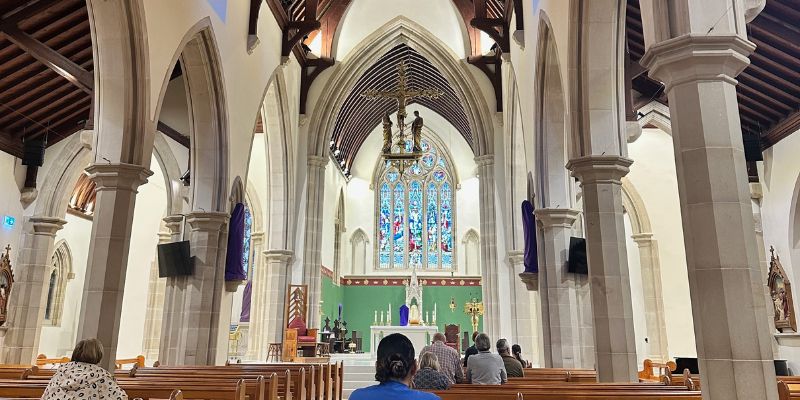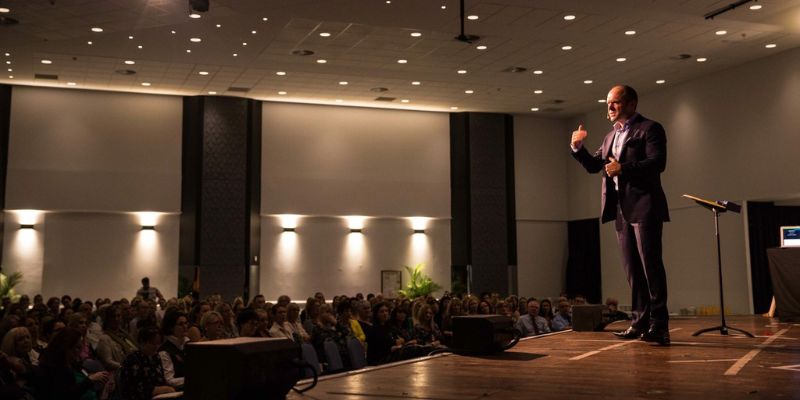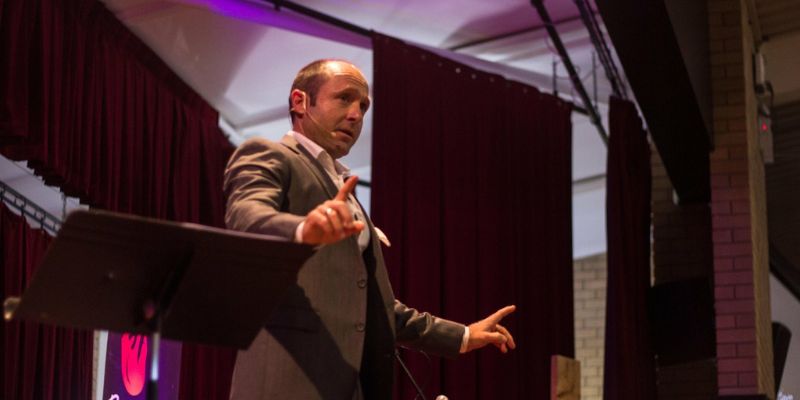Last week I had the pleasure of speaking in Tasmania for the Catholic Archdiocese of Hobart. They have a great leadership team and it’s been an absolute pleasure to be working with them. This is a team that understands not just the importance of leadership as a concept but of a deeply Catholic leadership lens and the importance of providing deep, rich and ongoing formation for their current and emerging leaders. It was also a great chance to share one of my foundational teaching principles for all Catholic teachers and leaders, the power of visionary leadership.

A Comprehensive Leadership Approach For Catholic Schools
My speaking tour involved four days of sessions split between Hobart and Campbell Town. The Archdiocese is geographically large and Campbell Town sits in the middle of Tasmania. Allowing formation programs to reach as many Catholic leaders and Catholic teachers as possible. What was important about these sessions is that they were being delivered to the widest possible arrangement of both current senior leaders and current teaching staff in Catholic schools who expressed an interest in Catholic leadership.
This is important because so often leadership in Catholic schools can seem like an exclusive on-ramp only accessible on rare occasions to the select few. It is relatively rare that any school or system develops a program whereby all staff can have the option to express an interest in leadership and pursue a process of deeper formation. We still seem to be trapped in the modality that leaders must be born for the role and that the only way in is to be tapped on the shoulder by the relevant gatekeeper.

What I observed on the third and fourth days was memorable. The Archdiocese, under the leadership of Dr. Gerard Gaskin, had developed a system where current teachers with an interest in exploring leadership roles can self-nominate to commence a two year leadership formation process. This allows for the creation of a pipeline of future Catholic educational leaders at a time when Catholic education desperately needs them. Not only is the program exploring the theory and practice of modern leadership. It is also forming staff in the rich Catholic anthropology so essential to students and entire schools living out their potential and flourishing as God intended.
The two groups of emerging leaders were wonderful to work with. There was a clear sense of energy, excitement and commitment as these classroom teachers took their first steps in learning more about the path of leadership.
Leadership Ambition In A Catholic School

One of the first things I discussed was the elephant in the room. The role of ambition in seeking leadership in the first place. It is almost never discussed in a Catholic context. To have any ambition to lead can be seen as problematic and rarely something to be discussed in polite company. If we are good Catholics, if we seek to love God and serve people, then surely ambition is something to be avoided. I shared a couple of points on this.
First, ambition in the Catholic leadership context should be framed within the context of a genuine desire to serve. If you desire to be a leader then let it be. Because leadership will allow you to reach and serve more people.
Second, it is not inherently wrong to seek a promotion into a leadership role. It is not inherently wrong to want to be paid more. God looks at the heart. The problem emerges when we seek power or status or control over others. Wanting more money so you can bless and support your family is not wrong. In many ways, the human story of growth and development has had a great deal to do with individuals seeking to make a positive difference while in the process improving their material circumstances.
The Path of Visionary Leadership

The main focus of the first main session was to introduce visionary leadership as a core principle of all leadership theory and practice. My desire was to help them contextualize not just any future leadership role they may have. But also, crucially, to understand visionary leadership as a central component of the task of self-leadership. This is important because I am convinced that all effective leadership has to begin with self-leadership. Whatever leadership culture emerges in a Catholic school can only ever be a reflection of the level of self-leadership undertaken by the people doing the actual leading. In essence, their self-leadership shapes the overall leadership experience.
I like to make a very clear point that we are always leading ourselves somewhere. My sense over many years is that the pace and complexity of modern life means many of us become detached from the incredible role of leadership we exercise over our own lives. We are often so busy and distracted that it is easy to lose an overall vision for our lives. And to switch to a kind of technology and consumption driven distraction. We must get back into the leadership cockpit of our own lives.
What is Visionary Leadership?

Visionary leadership was one of the main principles I internalized from my first Master’s Program in Educational Leadership and Management. I teach it to Catholic leaders and teachers under the following formula:
Visionary leadership is an articulated future state that is preferred to the current state.
Nothing happens if a leader does not have some sense of a different future. Imagine a major political figure on the campaign trail giving a speech where they say, “Vote for me because everything is perfect and we don’t need to change a single thing!” It might be honest or amusing but it is hardly inspirational. Very few people are likely to vote for nothing to change. As such, right at the beating heart, at the very core of all leadership is a sense that the leader wants something about the future to be different to the present.
Before I started my session with the emerging leaders I was talking to one of the participants, a young teacher called Ellen. I asked her why she was drawn to exploring her leadership potential. I wanted to know what she cared about. She talked about wanting to improve some key metrics for young people. She had a sense that more could be done to help students flourish in specific areas. It’s a perfect example of visionary leadership potential. Even if Ellen has not yet given it too much thought, at the heart of her leadership journey will be a sense that the way things are right now, is not quite the way they should be. There is what I like to call a divine satisfaction. It’s the leader’s sense that something needs to change, that it can change and that they want to change it.
The origin of this discontent can be divine. Because often the Holy Spirit will prompt us with a sense that something needs to be different. It can be related to the virtue of justice in the sense that something about the current system is not optimized to give to people what is due to them because of the One in whose image they are made. This adds an important dimension to Catholic leadership in that it requires current and emerging leaders to be people of prayer and sacrament who have genuine docility to the Holy Spirit and to the Magisterium of the Church. They need to be saints in training, disciples eager to hear the Master’s instructions.
“...divine satisfaction. It’s the leader's sense that something needs to change, that it can change and that they want to change it."
Questions For A Future Catholic Leader

Based upon the concept of divine dissatisfaction, take a moment to consider your own responses to the questions below. How might the Holy Spirit be prompting you:
- What can you think of in your current school setting that triggers a sense of divine dissatisfaction?
- How, specifically, would you like this situation to be different?
- What is it precisely that animates, upsets or excites you about this situation?
- What will happen if nothing changes about this situation?
Articulating Visionary Leadership

In my seminar I draw attention to the concept of articulation. Leaders need to articulate, leaders need to communicate and leaders need to sell. It does not matter if you have the greatest visionary leadership idea in human history. What matters is how many people you can inspire to follow you, support you or resource you. If you have a great idea but cannot articulate in a way that connects with people then often the vision struggles to be actualized.
Leaders need to master the art of persuasion. Learning to articulate your vision is central to the art and science of leadership. There is a reason that we still consider Churchill, Martin Luther King Junior, Margaret Thatcher and even Barack Obama as successful leaders. I am not talking about their politics per se but rather about their ability to sell ideas, to sell visions of a preferred future state that is better than the current state.
Developing Visionary Leadership In The Catholic School
In summary, the path of visionary leadership for the Catholic leader, principal or teacher is about growing in holiness and virtue so that the Holy Spirit has the best chance of prompting you with divine dissatisfaction. As that process unfolds in your life, the next task is to be able to articulate why it matters and why you want people to join you upon the adventure of change. Along with persuasive skills is the powerful role of your character in building genuine relationships. Even if you are a brilliant speaker, if people don’t like or trust you then it’s hard to get them to follow you. If there was a formula for visionary leadership it would look something like this:
- Develop a deep and authentic Catholic inner life based on the sacraments, prayer and scripture. This allows the Holy Spirit to guide you.
- Care about people. You can’t fake this. Put others first, build deep relationships.
- Begin to share your heart for change. Master the art of articulating what you care about and convincing others why it matters. Persuasion is the art of enrolling people in the possibility you are offering!
If you would like me to deliver training seminars in Catholic leadership for the leaders or teachers in your school or diocese then please reach out HERE.



One Response
This gave me plenty to think about and ignited a spark of excitement in me that I thought I lost! Even as a seasoned school leader there is significant benefit to reflecting on the vision and methods of articulation that you have highlighted here. Thank you!!!